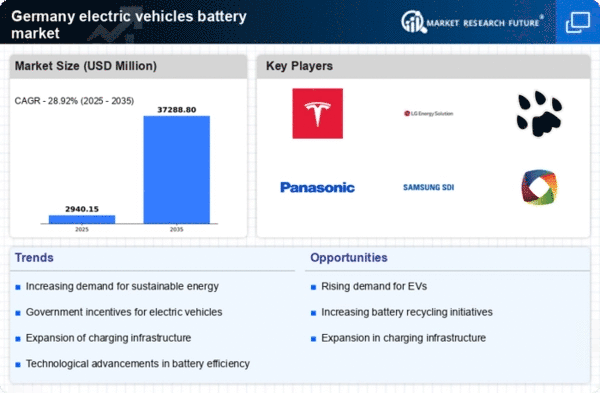Rising Demand for Electric Vehicles
The increasing consumer preference for electric vehicles is a primary driver for the electric vehicles-battery market. In Germany, the demand for electric vehicles has surged, with sales reaching approximately 1 million units in 2025, representing a growth of over 30% compared to the previous year. This trend is fueled by a growing awareness of environmental issues and the desire for sustainable transportation solutions. As more consumers opt for electric vehicles, the need for advanced battery technologies becomes critical. Consequently, manufacturers are investing heavily in research and development to enhance battery performance, longevity, and charging speed. This rising demand not only stimulates the electric vehicles-battery market but also encourages innovation and competition among battery producers, ultimately benefiting consumers with better products.
Corporate Sustainability Initiatives
Many corporations in Germany are adopting sustainability initiatives, which significantly impact the electric vehicles-battery market. Companies are increasingly recognizing the importance of reducing their carbon footprints and are transitioning their fleets to electric vehicles. This shift is evident as major corporations, including automotive giants, commit to electrifying their vehicle lineups by 2030. As a result, the demand for high-performance batteries is expected to rise sharply. The corporate sector's focus on sustainability not only drives the electric vehicles-battery market but also encourages innovation in battery technology. Furthermore, partnerships between corporations and battery manufacturers are likely to emerge, fostering advancements in battery efficiency and sustainability. This trend indicates a long-term commitment to electric mobility, which could reshape the market landscape.
Investment in Charging Infrastructure
The expansion of charging infrastructure is a crucial factor influencing the electric vehicles-battery market. In Germany, the government has committed to investing €3 billion in charging stations by 2025, aiming to install over 1 million charging points nationwide. This initiative is designed to alleviate range anxiety among potential electric vehicle buyers, thereby promoting higher adoption rates. A robust charging network enhances the practicality of electric vehicles, making them more appealing to consumers. As the infrastructure develops, it is expected that the electric vehicles-battery market will experience accelerated growth, as more individuals feel confident in transitioning to electric mobility. The interplay between charging infrastructure and battery technology is vital, as advancements in battery efficiency will complement the growing network of charging stations.
Regulatory Framework and Emission Standards
The regulatory environment in Germany plays a pivotal role in shaping the electric vehicles-battery market. Stricter emission standards imposed by the government are compelling automotive manufacturers to invest in electric vehicle technology. The European Union's target to reduce greenhouse gas emissions by 55% by 2030 is a significant driver for this transition. As a result, manufacturers are increasingly focusing on developing electric vehicles, which in turn drives the demand for advanced battery systems. Compliance with these regulations necessitates the production of batteries that not only meet performance standards but also adhere to sustainability criteria. This regulatory push is likely to accelerate innovation within the electric vehicles-battery market, as companies strive to meet the evolving demands of both consumers and regulatory bodies.
Technological Innovations in Battery Recycling
Technological advancements in battery recycling are emerging as a vital driver for the electric vehicles-battery market. In Germany, the focus on circular economy principles is prompting innovations in battery recycling processes. Efficient recycling methods can recover up to 95% of valuable materials from used batteries, significantly reducing the need for raw material extraction. This not only addresses environmental concerns but also enhances the sustainability of the electric vehicles-battery market. As battery manufacturers invest in recycling technologies, the overall lifecycle of batteries is extended, which may lead to cost reductions in battery production. Furthermore, the development of a robust recycling infrastructure is likely to create new business opportunities within the market, fostering a more sustainable approach to electric vehicle battery management.
















